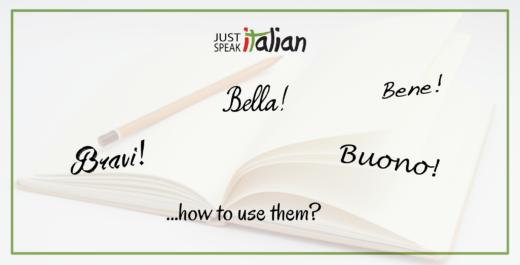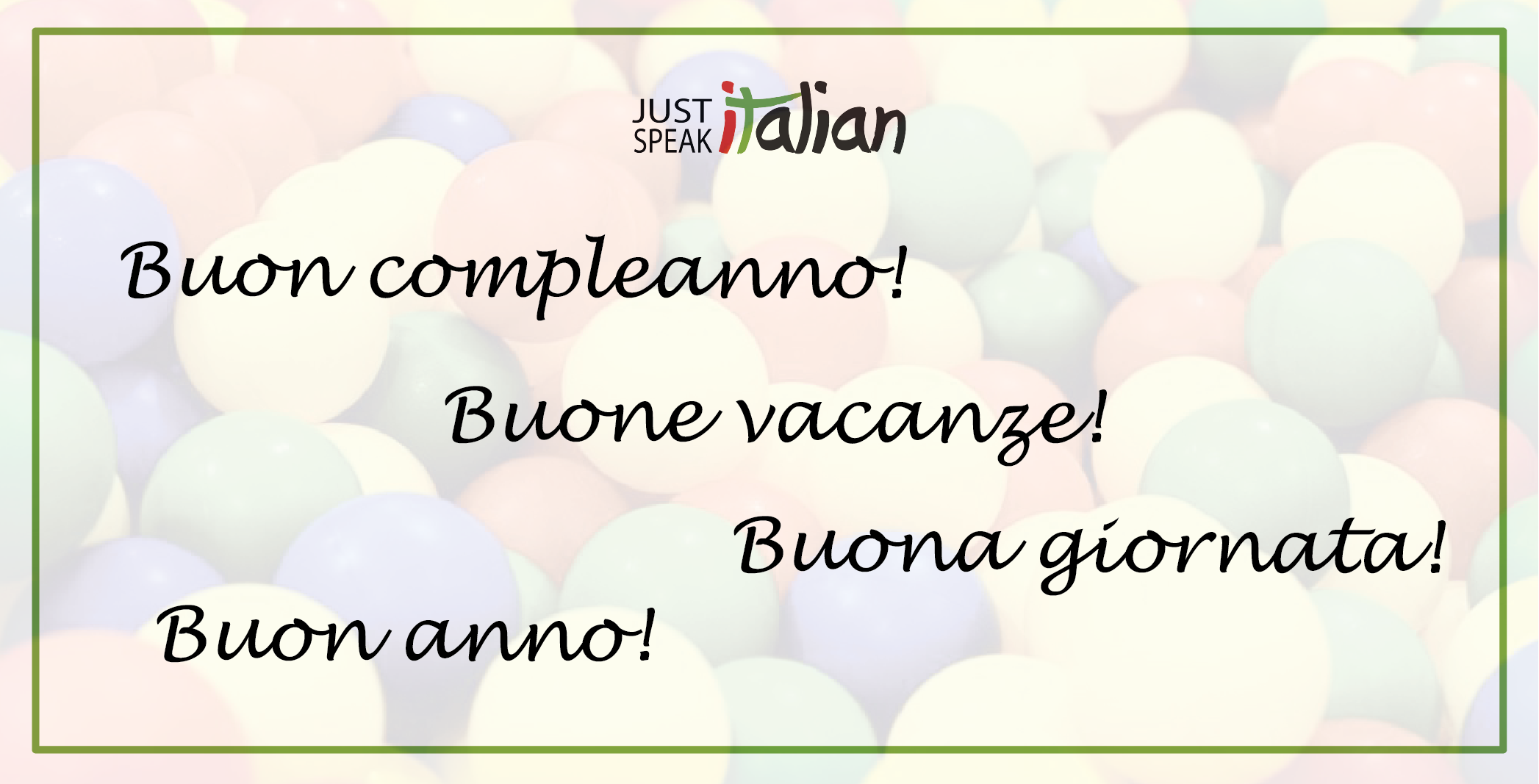30 Aug

Bello e buono sono due aggettivi molto usati nella nostra lingua ma spesso creano confusione negli studenti di italiano perché hanno significati simili e perché si comportano come gli articoli quando si trovano davanti ad un sostantivo. Se anche voi vi confondete quando dovete usarli, leggete questo articolo.
Bello and buono are two adjectives used a lot in our language but they often confuse Italian language students because they have similar meanings and because they behave like articles when they are placed before a noun. If you also get confused when you need to use them, read this article.
Prima di tutto, vediamo il significato di queste due parole.
Bello si usa per dire che qualcuno o qualcosa hanno un aspetto gradevole.
First of all, let’s have a look at the meaning of these two words.
Bello is used to say that someone or something has a pleasant appearance.
Esempi/Examples:
Mia sorella è una bella ragazza – My sister is a beautiful girl
Il mio vestito nuovo è bello – My new dress is nice
Buono si usa per dare un’opinione positiva sulla qualità di qualcosa o qualcuno.
Buono is used to give a positive opinion on the quality of something or someone.
Esempi/Examples:
La madre di Luca è una persona buona – Luca’s mother is a good person.
Ho letto un buon libro – I read a good book
Oppure per descrivere sapori o odori:
Or to describe flavors and smells:
Ho mangiato una buona pasta – I ate a good pasta
La biancheria ha un buon profumo – The sheets have a good smell
Per capire la differenza fra i due aggettivi, possiamo dire che qualcuno può essere bello ma non buono e viceversa. Se Maria è esteticamente attraente ma non si comporta bene, ha senso dire:
To understand the difference between these two adjectives, we may say that someone can be “bello” but not “buono” and vice versa. If Maria is aesthetically charming but she is not well-behaved, it make sense to say:
Maria è bella ma non è sempre buona con gli altri – Maria is beautiful but she is not always very kind to the other people.
ALTRI USI DI BELLO
L’aggettivo bello si usa anche per sottolineare un concetto:
The adjective bello is also used to highlight a concept:
Hai combinato un bel guaio! – You got into a fine mess!
ALTRI USI DI BUONO
Buono lo usiamo anche per fare gli auguri:
We use buono also to express wishes:
Buon Natale – Merry Christmas
Buon compleanno – Happy birthday
COME SI USANO BELLO E BUONO
Come sappiamo, in italiano l’aggettivo si trova di solito dopo il nome. Anche gli aggettivi bello e buono, quando si trovano dopo un sostantivo, si comportano in modo regolare.
As we know, in Italian the adjective is generally placed after the noun. Also the adjectives bello and buono behave regularly when they are placed after the noun.
Esempi/Examples:
Abbiamo organizzato sempre spettacoli belli – We have always organized beautiful shows
Ieri sera abbiamo visto un film bello – Yesterday we watched a good film
Sei sempre stato un uomo buono – You have always been a good man
Spero che tu abbia trascorso una giornata buona – I hope you have spent a good day
COME SI USA BELLO PRIMA DEI SOSTANTIVI
È possibile trovare bello prima di un sostantivo. In questo caso in genere l’espressione assume un’enfasi particolare e l’aggettivo segue le stesse regole dell’articolo determinativo:
It is possible to find bello before a noun. In this case the sentence usually gets a particular emphasis and the adjective follows the same rules of the definite article:
Bel libro –> bei libri
Bello spettacolo –> begli spettacoli
Bell’orologio –> begli orologi
Bella ragazza –> belle ragazze
Bell’amica –> belle amiche
Anche buono si può trovare prima di un sostantivo per dare enfasi a qualcosa. In questo caso l’aggettivo segue le stesse regole dell’articolo indeterminativo al singolare, mentre la forma plurale è regolare.
Buono can be found before a noun too to place emphasis on something. In this case the adjective follows the same rules of the indefinite article before a singular noun, while the plural form is regular.
Esempi/Examples:
Buon anno –> buoni anni
Buono studio –> buoni studi
Buona notte –> buone notti
CONFRONTA ADESSO LE DUE FRASI/COMPARE THESE SENTENCES NOW
Abbiamo organizzato sempre spettacoli belli <-> Abbiamo organizzato sempre begli spettacoli
Ieri sera abbiamo visto un film bello <-> Ieri sera abbiamo visto un bel film
Sei sempre stato un uomo buono <-> Sei sempre stato un buon uomo
Spero che tu abbia trascorso una giornata buona <-> Spero che tu abbia trascorso una buona giornata
BENE E BRAVO
Ci sono altre due parole che spesso creano confusione: bene e bravo.
There are two more words which often create some confusion: bravo and bene.
Bene è un avverbio (quindi non cambia dal femminile al maschile) e modifica leggermente il significato del verbo. È usato per esprimere un’opinione positiva o per dire che qualcuno sa fare bene qualcosa.
Bene is an adverb (so it doesn’t change from feminine to masculine) and it slightly modifies the meaning of the verb. It is used to express a positive opinion or to say that someone is good at doing something.
Esempi/Examples:
La macchina funziona bene – The machine works well
Marco suona bene la chitarra – Marco is good at playing the guitar
Bravo è un aggettivo usato solo con gli essere umani per dire che qualcuno si comporta educatamente o è bravo a fare qualcosa.
Bravo is an adjective only used with human beings to say that someone behaves politely or is good at doing something.
Esempi/Examples:
Tuo fratello è un bravo ragazzo – Your brother is a good boy
Maria Callas era una brava cantante – Maria Callas was a good singer
Ricordate che bravo è un aggettivo e quindi cambia dal maschile al femminile e dal singolare al plurale. Se vi trovate a teatro, battendo le mani durante un concerto, dovrete esclamare ai membri dell’orchestra “bravi!” e non “bravo!”.
Don’t forget that bravo is an adjective so it changes from masculine to feminine and from singular to plural. If you are in a theatre, clapping your hands during a concert, you must shout to orchestra members “bravi!” instead of “bravo!”.
Vi auguriamo adesso buono studio (per esempio guardando un bel film): siamo sicuri che parlerete presto bene l’italiano perché siete bravi studenti!
Now we wish you good luck with your studies (for an example watching a good film): we are sure that you will speak Italian well soon because you are good students!

